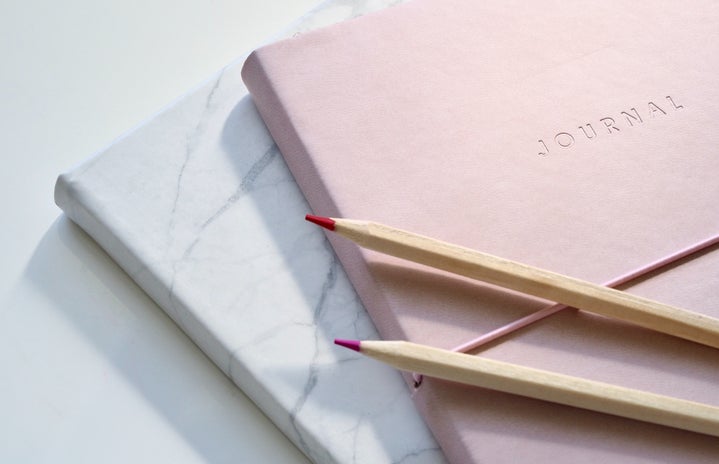Let’s be honest; we all have a pile of journals, stashed away somewhere, that we’ve accumulated over the years but have never touched for a million reasons; it’s “too pretty” to use, we don’t have anything to write, writing is too difficult, etc. In other words, we’re afraid we won’t be able to meet our own expectations.
You shouldn’t be stressing about “saving” that journal for something special or stressing about journaling in general—it’s meant to be relaxing, after all. My goal here is to make the idea of journaling seem freeing, something to be explored, not intimidated by.
Here are a few stress-free ways you can fill those empty journals:
1. Bad Poetry
Yes, poetry can be pretty difficult. But wanna know a secret? I am a terrible, terrible poet. Even so, I keep a separate journal just for poetry because sometimes I feel the urge to write a poem, one I can’t shake until I do. So, when I have an idea in my head, no matter how undeveloped or impulsive, I take out that notebook and scribble until I’m satisfied—and, even if it’s bad, I end up satisfied with what I wrote.
It doesn’t have to be perfect. It doesn’t even have to be good. Write that bad poem. Who cares if it’s the worst poem anyone has ever written? The poetry police isn’t going to come knocking on your door. What do you have to lose?
2. Your Emotions. Especially the Confusing Kind.
We human beings are emotional creatures. Whether our emotions are positive or negative, they can completely overwhelm us and sometimes even confuse us. Writing how you’re feeling helps you work through your emotions but also can help you understand them better (“What am I feeling? Why do I feel this way?”). It can also help improve your mental health and help you prioritize the problems you’re facing. For me, writing my emotions can be pretty therapeutic, almost like talking it out. It untangles the knot of emotions inside me and instead lays them out one by one, like taking a long exhale.
3. Memories, Good or Bad (But Especially Good)
Taking note of your memories in your journal is a great, no-pressure way to fill it up. Whenever something extremely good or fun happens to me, something that makes me think, I want to remember this forever, I tell myself, “I have to write this down,” and try to remember everything I can, every little detail.
Recounting your memories in writing is a great way to remember them, both because you can look back on them and because you’ll remember having written them down. Not only that, but it immortalizes your memories, and unlike a photograph or video, you also attach your emotions and thoughts to it: how you felt like fireworks were going off in your gut, how your cheeks hurt from smiling, how you could hear the blood roaring in your ears. Even if it’s a bad memory, in the future, you’ll be able to see how, however bad it was, terrible you felt at the time, you were able to move past it. Adding your own take on the things that happen in your life—that personal flair—is something that writing can capture in a way no other medium can.
4. Follow Some Prompts
Out of ideas? No inspiration? Don’t fret—here are some prompts to help you start off, hopefully, to ignite your journaling journey:
- Describe the best day of your life—try to recall every detail, feeling, and sensation you can
- Write yourself a letter, then stow it away for a year before reading it again. It doesn’t have to be profound (but it can); write whatever you want—something your future self will enjoy reading (jokes, goals for the next year, your favourite things at the moment, etc.)
- Describe this very moment—how you feel, the things you can smell and touch, what you can see (the sky’s shade of blue, the smell of wet grass, the warmth and softness of your favourite blanket wrapped around you…)
- Write about your favourite person—describe their defining characteristics, internal and external (the giant blue clip they always wear in their hair, their loud, contagious laugh, their immeasurable generosity), what makes them your favourite person (they always wait when you have to tie your shoe, they know your mind like you know your own), your best memories with them (that time you got trapped in an elevator for 45 minutes, your overnight trip to Niagara Falls), or anything else that comes to mind when you think of them.
- Find some more online, like here.
5. Anything That Comes to Mind. Literally Anything.
Listen, I’m no Sylvia Plath. I have no profound revelations to note or emotions to reveal. If you see me writing in my journal, I’m probably writing about the most mundane things possible, like how I’m craving an Oreo McFlurry, or summarizing my day, which consists of even more mundane things. Writing your thoughts, no matter how unimportant or boring, can be entertaining—especially looking back on it later (“Oh, look, in March of last year, I was listening to “The Adults are Talking” by The Strokes and lying on the couch while my sister baked peanut butter cookies in the kitchen). Humouring your seemingly less-than-important thoughts and describing the mundane may be your starting point to generating brighter, more developed ideas and topics.
Hopefully, this has taken the pressure out of journaling and has made it seem actually a bit fun. So, now that you realize how enjoyable journaling can be, go dust off that old journal, grab your favourite pen, and get to writing.


